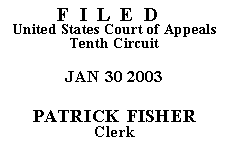

| UNITED STATES OF AMERICA, | No. 02-8022
D.C. No. 01-CR-101-02-B |
Under the Sentencing Guidelines, a defendant may receive a reduction of up to three offense levels for acceptance of responsibility if he "clearly demonstrates a recognition and affirmative acceptance of personal responsibility for his offense." U.S.S.G. § 3E1.1. Generally, a reduction in offense level for acceptance of responsibility is not available where a defendant goes to trial and puts the government to its burden of proof by denying the essential factual elements of guilt. Id., cmt. n.2. In "rare situations," however, a defendant may deserve the reduction for acceptance of responsibility even though he goes to trial. Id. For example, a defendant may clearly demonstrate acceptance of responsibility but elect to go to trial to "assert and preserve issues that do not relate to factual guilt," such as challenging the constitutionality of a statute or the applicability of a statute to the defendant's conduct. Id.; see also United States v. Portillo-Valenzuela, 20 F.3d 393, 394 (10th Cir. 1994). We will reverse a district court's finding that the defendant did not accept responsibility only upon a showing of clear error. Id.
The defendant in this case did provide some cooperation to the authorities. Tejeda was arrested on June 18, 2001, after he sold methamphetamine to a government informant. (ROA VIII at 3.) Following his arrest, Tejeda gave several voluntary statements to the police admitting that he had been selling methamphetamine for several months. (ROA II, doc. 92 & attach. (police summary of Tejeda's statements).) In his statements, he provided the police with the names of some of his customers and admitted to having traded methamphetamine to one of his customers in exchange for a .44 caliber handgun. (ROA VIII at 6.) Tejeda gave the police written consent to search his room at the house where he was living so that the handgun could be recovered. (Id.) He also made for the police a controlled purchase of methamphetamine from his supplier, who subsequently was arrested. (Id.)
However, whatever recognition and personal acceptance of responsibility Tejeda may have demonstrated by his pre-trial cooperation was undone by his insistence on proceeding to trial on all four counts against him. Tejeda claims that his purpose for going to trial "essentially was limited to countering the Government's efforts to inflate those drug quantities to which Tejeda voluntarily confessed--a challenge to the charged drug quantity the Government alleged was associated with charged conspiracy [in Count One]." (Aplt. B. at 19.) But this objective could have been accomplished by pleading guilty to the three counts in the indictment unaffected by his dispute as to the drug quantity involved in the single conspiracy count. Instead, Tejeda formally denied factual guilt as to all the counts with which he was charged by pleading not guilty, and he forced the government to bear the burden of a four-day trial at which it had to prove every element of every charge against him.
Considering Tejeda's conduct at trial, we cannot say that the district court clearly erred in concluding that Tejeda had not accepted responsibility for his crimes. See, e.g., Portillo-Valenzuela, 20 F.3d at 394 ("Despite Portillo-Valenzuela's pretrial confession, the district court did not clearly err by concluding that forcing the government to prove factual guilt at trial indicated failure to clearly demonstrate acceptance of responsibility."); United States v. Garcia, 987 F.2d 1459, 146162 (10th Cir. 1993) (sustaining district court's denial of sentencing reduction because defendant forced the government to go to trial on all counts, even though he claimed that he admitted responsibility before trial on all but the one count of which he was acquitted). "Pleading not guilty and requiring the government to prove guilt at trial demonstrate denial of responsibility, regardless of how easily the government can prove guilt." Portillo-Valenzuela, 20 F.3d at 39495.
CONCLUSION
Accordingly, we find that the district court did not clearly err when it refused to award Tejeda a § 3E1.1 downward adjustment for acceptance of responsibility. The sentence is AFFIRMED.
ENTERED FOR THE COURT
David M. Ebel
Circuit Judge
*.After examining appellant's brief and the appellate record, this panel has determined unanimously that oral argument would not materially assist the determination of this appeal. See Fed. R. App. P. 34(a)(2) and 10th Cir. R. 34.1(G). The case is therefore ordered submitted without oral argument. This order and judgment is not binding precedent, except under the doctrines of law of the case, res judicata, and collateral estoppel. The court generally disfavors the citation of orders and judgments; nevertheless, an order and judgment may be cited under the terms and conditions of 10th Cir. R. 36.3.